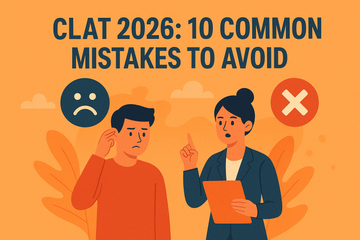The Common Law Admission Test (CLAT) is one of India's most competitive entrance exams for students aspiring to pursue law at the undergraduate or postgraduate level. Every mark counts with over 70,000 aspirants appearing for just 3,000-4,000 seats across prestigious National Law Universities (NLUs). While the syllabus might seem manageable, even well-prepared candidates often fall short due to small yet critical mistakes.
In this blog, we take you through 10 common mistakes students make while preparing for CLAT 2026, and how avoiding them can boost your rank and improve your chances of securing admission in top NLU's, like NLSIU Bangalore, NALSAR Hyderabad, WBNUJS Kolkata and others.
Ignoring the CLAT Exam Pattern and Syllabus
Mistake: Many aspirants start preparing for CLAT without thoroughly understanding what the exam tests.
How to Avoid It: CLAT has a unique pattern. It is a comprehension-based test, which means rote learning or factual memorization won’t work. The exam comprises 5 sections:
- English Language
- Current Affairs including General Knowledge
- Legal Reasoning
- Logical Reasoning
- Quantitative Techniques
Each of these sections is passage-based, testing your reading comprehension, analytical skills, and logical thinking. Ensure you're updated with any changes announced by the Consortium of NLUs and tailor your preparation accordingly.
Not Reading Newspapers and Editorials Regularly
Mistake: Depending solely on current affairs PDFs or YouTube summaries.
How to Avoid It: CLAT’s GK section tests your understanding of current events in context, not just facts. Reading newspapers like The Hindu, The Indian Express, or magazines like Frontline helps build a habit of analysis. Focus on editorials, legal developments, major national and international events, and policy changes.
Underestimating the Power of Mock Tests
Mistake: Starting mock tests too late or taking them casually without reviewing them.
How to Avoid It: Mocks are not just for practice—they're a mirror of your preparation. Begin mock testing at least 6–8 months before CLAT. Take one full-length mock test every 10 days initially, and increase frequency as you approach the exam. After each test, spend at least 2–3 hours analyzing your performance.
Avoiding Legal Reasoning Until the End
Mistake: Postponing legal reasoning practice thinking it’s too technical or not needed.
How to Avoid It: You don’t need prior legal knowledge, but you must master legal reasoning techniques. Legal Reasoning tests your ability to read laws or principles and apply them to real-life or hypothetical situations. Regular practice sharpens your interpretation skills, essential for future law studies too.
Blindly Following Coaching Institutes Without Personal Customization
Mistake: Over-reliance on coaching notes and schedules.
How to Avoid It: Coaching can provide structure, but no one knows your learning style better than you. Create your own study plan, set targets based on your weak areas, and use coaching materials as reference, not your sole guide.
Pro Tip: Supplement coaching with online resources, legal blogs, law magazines, and mock portals.
Skipping or Neglecting Quantitative Techniques
Mistake: Assuming Quantitative Techniques is too difficult or not important due to fewer questions.
How to Avoid It: This section may have only 10–15 marks, but it can be a scoring zone with practice. Focus on percentages, ratios, data interpretation, averages, and time-work questions. Solve at least 5–10 DI sets per week and keep practicing basic math operations.
Ignoring Vocabulary, Grammar, and Reading Comprehension Practice
Mistake: Thinking English is easy because it's your everyday language.
How to Avoid It: CLAT’s English section focuses on deep reading comprehension and contextual vocabulary. Reading complex texts like legal case summaries, editorials, and opinion pieces helps improve reading speed and comprehension accuracy. Practice solving RCs from varied topics—philosophy, science, economics, etc.
Not Following a Structured and Time-Bound Study Plan
Mistake: Studying randomly without setting daily/weekly goals.
How to Avoid It: Create a balanced study timetable. Allocate time blocks to each subject, including reading, practice, and revision. Following a schedule enhances productivity and reduces last-minute stress.
Pro Tip: Use time management techniques like the Pomodoro Technique (25 minutes focused study + 5 minutes break).
Not Revising and Avoiding Doubt Resolution
Mistake: Spending too much time learning new topics and skipping revision.
How to Avoid It: Revision is crucial for retaining concepts, especially in GK, legal principles, and vocabulary. Make short notes, flowcharts, and flashcards for quick revision. Set aside one day per week solely for reviewing previous content.
Pro Tip: Join discussion forums or Telegram groups for regular doubt clearance and peer learning.
Letting Stress and Anxiety Take Over
Mistake: Panicking in the final months, comparing scores, or changing strategies frequently.
How to Avoid It: Stress management is as important as preparation. Stay consistent, practice meditation, and talk to mentors or friends when you feel overwhelmed. Don’t compare yourself to others—focus on self-improvement.
During the last 30 days, focus more on mocks, revision, and maintaining a calm mindset. Avoid overloading yourself with new material.
Trusted Resources – GK Publications
When it comes to smart and strategic CLAT preparation, GK Publications is a name trusted by thousands of law aspirants across the country. Our books are meticulously crafted by experts and aligned with the latest CLAT exam pattern, including passage-based questions, current affairs, legal reasoning, and more.
Whether you're in the early stages of your preparation or brushing up in the final stretch, GK Publications offers a complete suite of resources to support you—
1. CLAT & AILET 2026 Master Guide
By Gautam Puri
An all-in-one guide with topic-wise practice tests and fully solved papers from 2021 to 2025. Perfect for concept clarity and exam pattern familiarity.
Why it helps:
- Targeted practice on each section
- 2 full-length mock tests for real-exam simulation
- Ideal for structured and strategic preparation
2. CLAT & AILET 2026 | 10 Mock Tests
By Priya Jain
Designed to simulate the real exam, this book includes 10 full-length mocks and solved papers from 2023 to 2025.
Why it helps:
- Experience the pressure and pacing of the actual test
- Analyze detailed solutions and refine your strategy
- Stay updated with the latest exam trends
3. 18 Years Chapter-Wise Solved Papers (2008–2025)
By Gautam Puri
Covers English, Legal Aptitude, Logical Reasoning, Quant, and GK—all in a chapter-wise format for deep practice and focused revision.
Why it helps:
- Extensive practice from real questions
- Chapter-wise breakdown simplifies revision
- Fully solved papers till 2025 to track trends
4. CLAT & AILET 2026 Complete Law Entrance Guide
By Priya Jain
Covers CLAT, AILET, PU, DU, BHU, MAH-CET, SLAT, Christ University, and more. Includes CLAT & AILET 2025 solved papers and free online mocks.
Why it helps:
- Section-wise preparation for all major law entrance exams
- Ample practice aligned with the latest exam patterns
- Increases your chances of selection across multiple exams
Stay ahead. Study smart. Succeed with GK Publications.
CLAT is not just about how much you know—it’s about how well you can apply your knowledge under time pressure and in unfamiliar contexts. Avoiding these common preparation mistakes can make a substantial difference in your final score and bring you one step closer to your dream law school.
By understanding the exam pattern, practicing consistently, managing your time effectively, and keeping stress in check, you’re already ahead of thousands of other aspirants. It’s not about studying harder, but smarter—with focus, discipline, and the right strategy.
Key Takeaways:
- Start early and understand the syllabus thoroughly.
- Make newspaper reading and editorial analysis a daily habit.
- Practice mock tests regularly and review your mistakes.
- Don’t ignore legal reasoning or quantitative techniques.
- Revise frequently and evaluate your progress consistently.








hgq7aa